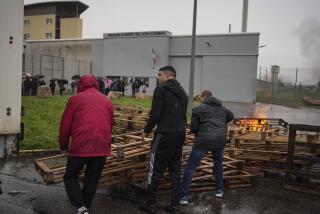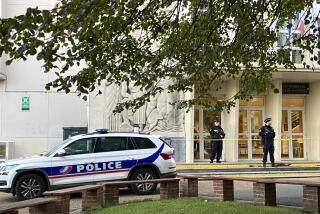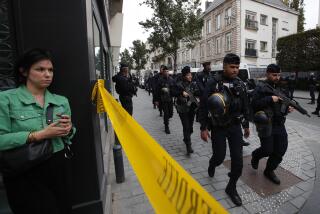N. African Arraigned in British Slaying
LONDON — British prosecutors filed murder charges Friday in the stabbing death of a detective by a suspect whom European investigators describe as a member of an Al Qaeda-linked Algerian terrorist network that has been active in Britain, France and Chechnya.
Nine police guards in body armor dwarfed a diminutive Kamel Bourgass, 27, as he was arraigned in the murder of Det. Stephen Oake, 40, and the attempted murders of four other officers who were injured during a fracas in a Manchester apartment this week. A judge at Belmarsh Magistrates Court ordered the handcuffed Bourgass, attired in a hooded white forensics suit that left only his face visible, held without bail.
Although British authorities had little more to say about Bourgass, other European law enforcement officials told The Times that Bourgass is allegedly a member of a dangerous Algerian network, which includes members recently returned from the separatist Russian republic of Chechnya intent on carrying out attacks. Bourgass is believed to be Algerian; British police said only that he is North African.
Through Bourgass, whose arrest resulted from an alleged plot to produce ricin poison in London, the detective’s murder is linked to a cell that plotted attacks on Russian targets in Paris and a cell dismantled in November that allegedly scouted the London subway for a cyanide gas attack, investigators said. In addition, Russian investigators said they believe the ricin plot has ties to similar activity involving Al Qaeda and anti-Russian rebels in Chechnya and neighboring Georgia.
An Algerian arrested in the subway case, Rabah Kadre, was a leader of a network that included the remnants of a longtime London-based organization involved in a 1999 plot to bomb LAX and Algerian veterans of the conflict in Chechnya, a magnet for itinerant holy warriors. Chechnya and training camps in Georgia’s Pankisi Gorge took on increasing importance after the loss of Al Qaeda’s bases in Afghanistan in late 2001, police say.
“Bourgass is part of the Algerian movement of Rabah Kadre,” a European police official said. “There was intelligence information on him in Europe. The stabbing happened after the officers ... realized that he was a relevant person in the network.”
The killing set troubling precedents. It was the first slaying of a police officer in Western Europe by an Islamic extremist since Al Qaeda and its allied networks became a threat in the 1990s, officials said.
And it showed the increasingly violent, global and unpredictable nature of Islamic terrorism today. Al Qaeda drew first blood in Britain, where the North African foot soldiers of the network had carefully refrained from violence because the country was a hub for recruiting, ideological activity and directing attacks in France and elsewhere, police said.
Now, however, Al Qaeda leader Osama bin Laden has declared war on Britain, Germany and Italy as well as France, a perennial target of Algerian extremists who were absorbed into the Al Qaeda alliance in the 1990s. Although Al Qaeda’s networks have been splintered and hounded by law enforcement, fighters are converging on Western Europe in an attempt to carry out Bin Laden’s orders, officials said.
“You have the Chechnya group, you have people coming in by way of Syria, from Turkey and other routes as well,” the European police official said. “You have more and more of these little uncontrollable groups trying to do whatever they can.”
The threat is truly global. Russian investigators believe that four Algerians involved in a makeshift ricin lab discovered in London are tied to Chechen rebels who also tried to produce ricin. The poison’s manufacture is described in Al Qaeda training manuals seized in Afghanistan after the Sept. 11 attacks and, according to Russian authorities, in a notebook found recently during a special operation at a rebel base in Chechnya.
“What we know about the preliminary results of the investigation in London and the information we already gathered in Chechnya and also received from our Georgian colleagues leads us to believe that several centers specializing in poisonous substances production existed in Chechnya, Pankisi Gorge and London,” said Alexander Safronov, a spokesman for the presidential information directorate in Moscow. “These centers were obviously interconnected and were funded by some terrorist organizations, one of which was Al Qaeda.”
Georgian officials confirm the presence of shooting ranges and Arab fighters in the Pankisi Gorge but say they cannot be sure about the alleged ricin production. Advocates of the Chechen rebels dismiss the Russian accusations as an attempt to lump them with Al Qaeda.
But there is little doubt that the Chechen conflict helped create terrorists accused of plotting holiday attacks in France and Britain, according to French investigators. At least three suspects arrested at safe houses in suburban Paris recently trained at camps in the Pankisi Gorge, where they had contact with Chechen rebels as well as Al Qaeda leaders specializing in the use of toxic chemicals, according to the French Interior Ministry.
It is not known if Bourgass, the Manchester detective’s alleged killer, trained at terrorist camps in Afghanistan or the Caucasus. But counter-terrorism experts in Europe were taken aback by the unusual bloodshed. British authorities say the 5-foot-6 Bourgass lashed out with a kitchen knife as he was being held -- without handcuffs -- during a search of the apartment where police found him with two other suspects.
Until this week, the worst violence against police in Europe involving Islamic terrorists had taken place in the mid-1990s, when French and Belgian police traded gunfire with members of the Armed Islamic Group of Algeria, whose bloody crusade spawned today’s Algerian affiliates of Al Qaeda.
And during the post-Sept. 11 crackdown in Europe, a few suspects have tried to escape. A Paris associate of London subway suspect Kadre tried to bolt out of a window as French police swarmed his apartment in November. But there have been few assaults on police.
Police in France, Belgium, Italy and other countries usually take no chances. They entrust anti-terrorism raids to armed tactical teams. As a result of the Manchester raid, in which some of the officers were unarmed, British authorities are considering the use of armed units in future anti-terrorism operations.
*
Rotella reported from Paris and Stobart from London. Times staff writer John Daniszewski in Moscow contributed to this report.
More to Read
Sign up for Essential California
The most important California stories and recommendations in your inbox every morning.
You may occasionally receive promotional content from the Los Angeles Times.










